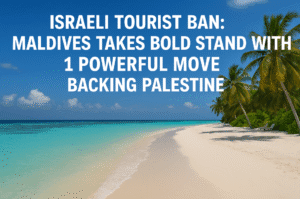Israeli Tourist Ban: Maldives Takes Bold Stand with 1 Powerful Move Backing Palestine
In a bold display of solidarity with Palestine, the Maldives has officially banned Israeli passport holders from entering the country, citing Israel’s military actions in Gaza as “ongoing acts of genocide.” President Mohamed Muizzu signed the amendment to the Maldives Immigration Act, reinforcing the nation’s condemnation of violence and its firm stance on human rights. The decision, quickly ratified by parliament, reflects a moral stand against what the government describes as atrocities committed against over 50,000 Palestinians in recent months.
While the move is largely symbolic—given the minimal number of Israeli tourists—the Maldives joins other South Asian nations like Bangladesh and Pakistan in denying entry to Israeli nationals. Despite tourism being vital to the Maldivian economy, with China and India as the top sources, the government has prioritized ethical principles over economic considerations.
The policy aligns with the country’s continued advocacy at international forums like the UN, demanding accountability for violations of humanitarian law. Regional reactions remain mixed, with Sri Lanka yet to impose similar restrictions. Analysts believe this stance could strengthen the Maldives’ diplomatic voice globally, though it may provoke tension with Israel. The government maintains the ban will stay in place until Israel halts its aggression and complies with international legal norms.

Israeli Tourist Ban: Maldives Takes Bold Stand with 1 Powerful Move Backing Palestine
In a decisive move underscoring its support for Palestine, the Maldives government has officially barred Israeli passport holders from entering the island nation. President Mohamed Muizzu ratified the policy on Tuesday, amending the Maldives Immigration Act to reflect the nation’s condemnation of Israel’s military actions in Gaza, described as “ongoing acts of genocide” in an official statement.
A Stand Against “Atrocities”
The amendment, swiftly passed by the Maldives’ parliament, signals a direct response to the escalating violence in Gaza, where over 50,000 Palestinian lives have been lost in recent months. The government emphasized its “unwavering commitment to Palestinian rights” and pledged to advocate for international accountability for violations of humanitarian law. “This ban reaffirms our moral obligation to oppose injustice,” the statement read, aligning the Maldives with global calls for a ceasefire and lasting peace.
Tourism Impact and Regional Context
While tourism forms the backbone of the Maldivian economy, Israeli visitors represent a negligible fraction of arrivals. Recent data shows China (11%) and India (5%) as top source markets, with 729,932 tourists recorded in 2025 so far. The ban, effective immediately, is largely symbolic but places the Maldives alongside Bangladesh and Pakistan in South Asia, both of which have long restricted Israeli entry. Bangladesh recently reinforced its stance by reintroducing passport clauses prohibiting travel to Israel.
Regional Reactions and Implications
Neighboring Sri Lanka, while vocal in its support for Palestine, has not imposed similar restrictions despite local concerns over Israeli tourists operating businesses in hotspots like Arugam Bay. The Maldivian decision has sparked debate on balancing diplomatic principles with economic interests, particularly for nations reliant on tourism.
Global Advocacy and Next Steps
The Maldives has consistently used international platforms, including the United Nations, to condemn Israel’s policies. Analysts suggest the ban could bolster its advocacy efforts but may also invite diplomatic friction. As of now, Israel has not issued an official response.
President Muizzu’s administration asserts the policy will remain until Israel “ceases its brutal aggression” and adheres to international law. For now, the idyllic archipelago—known for luxury resorts and coral atolls—sends a clear message: geopolitical solidarity trumps tourist dollars in this Indian Ocean paradise.
You must be logged in to post a comment.